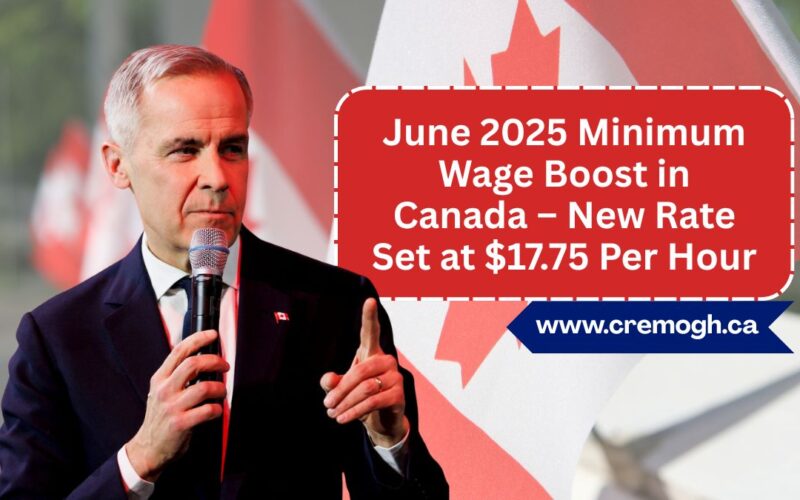In June 2025, Canada will experience a 2.4% minimum wage increase, reaching $17.75 per hour in many provinces and territories.
This new wage hike aims to improve the financial well-being of millions of Canadian workers, ensuring that individuals can better cope with the increasing cost of living.
In this article, we’ll explore the minimum wage changes, what they mean for workers, and how they will impact the Canadian economy.
Understanding the 2.4% Minimum Wage Increase
The 2.4% increase to the Canada minimum wage is part of the government’s ongoing efforts to address income disparity and help workers maintain purchasing power amidst inflation. The increase is a result of yearly evaluations and adjustments aimed at keeping wages in line with living costs.
This wage hike will benefit both full-time and part-time workers, as well as those in industries where minimum wage jobs are more common, including retail, hospitality, and service industries.
The new rate of $17.75 per hour is a significant step toward improving financial stability for workers across the country. Although not a complete solution to all income inequality issues, this raise provides a much-needed cushion against the rising costs of essentials like housing, food, and transportation.
Key Details of the Minimum Wage Increase in Canada
- Effective Date: June 2025
- Increase: 2.4%
- New Minimum Wage: $17.75 per hour
- Who Benefits: Full-time and part-time workers, especially in low-wage industries
The minimum wage increase applies to all employees in the eligible regions. However, each province and territory may have slightly different minimum wage rates, reflecting local economic conditions and labor market demands.
How This Affects Workers in Canada
Who Qualifies for the Minimum Wage Increase?
The increase will apply to all workers covered under provincial or territorial minimum wage laws. This includes:
- Full-time and part-time employees in low-wage jobs
- Seasonal workers in industries such as agriculture and hospitality
- Contract workers and temporary workers who are not covered by collective bargaining agreements
Some exemptions might apply depending on the province, but in general, this increase will benefit the majority of workers in the lowest income brackets. Students, youth, and apprentices may also see wage increases, depending on the regulations in their specific provinces.
How the Wage Increase Will Help Low-Income Workers
The $17.75 per hour minimum wage will positively affect low-income workers by:
- Increasing disposable income: Workers will have more money to spend on essential goods and services, including food, healthcare, and transportation.
- Reducing poverty: By raising the minimum wage, Canada aims to lower poverty rates and improve the living standards of the most vulnerable citizens.
- Boosting economic activity: As low-income individuals have more money to spend, this increase can stimulate the economy through increased consumer demand.
Impact on the Canadian Economy
The minimum wage increase can have several economic benefits, including:
- Improved productivity: When workers earn better wages, they tend to be more motivated, resulting in higher productivity and lower turnover rates in companies.
- Reduction in reliance on government aid: With higher wages, workers may need fewer government assistance programs, which can reduce the burden on welfare systems.
- Attracting talent: Higher wages may make industries that rely on minimum wage labor more competitive, attracting a better pool of workers and improving service quality.
However, the increase also brings about challenges such as higher labor costs for businesses, which may lead to increased prices for goods and services, affecting overall inflation.
Summary of Minimum Wage Increase by Province
| Province/Territory | Current Minimum Wage (2024) | New Minimum Wage (2025) | Increase Percentage |
|---|---|---|---|
| Ontario | $15.50 per hour | $17.75 per hour | 14.5% |
| British Columbia | $16.75 per hour | $17.75 per hour | 6.0% |
| Quebec | $13.50 per hour | $14.50 per hour | 7.4% |
| Alberta | $15.00 per hour | $17.00 per hour | 13.3% |
| Nova Scotia | $14.50 per hour | $17.75 per hour | 22.4% |
What This Means for Employers
While the minimum wage increase benefits workers, it also poses a challenge for employers, particularly those in industries with large numbers of minimum-wage employees. Here’s how employers may be affected:
- Higher labor costs: Employers will need to adjust their payrolls, which may lead to higher prices for goods and services or increased automation to reduce the number of employees required.
- Greater competition: In some regions, businesses that have struggled to compete with lower wages may see an advantage in attracting and retaining talent.
- Increased pressure on small businesses: Small businesses, which rely heavily on low-wage workers, may face difficulties absorbing the new wage rate without altering their business models.
The 2.4% minimum wage increase in Canada, effective from June 2025, is a vital step toward improving the financial health of low-income workers across the country.
As the new wage rate rises to $17.75 per hour, workers will benefit from higher purchasing power, which can help alleviate financial pressure caused by inflation and cost-of-living increases.
For employers, the challenge will be balancing higher labor costs with maintaining profitability. However, for many Canadian workers, this increase is a welcome move that will help improve their quality of life and ensure they are better equipped to manage rising living costs.
FAQs
Who will benefit from the minimum wage increase in Canada in June 2025?
The wage increase will apply to full-time, part-time, seasonal, and contract workers in eligible industries across provinces that follow provincial minimum wage laws.
How much will the minimum wage increase in Canada by June 2025?
The minimum wage will increase by 2.4%, bringing the hourly rate to $17.75 in many provinces and territories.
What impact will the minimum wage increase have on businesses?
Businesses may face higher labor costs, which could result in price increases for consumers or the implementation of automation to maintain profitability.
